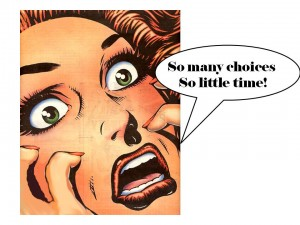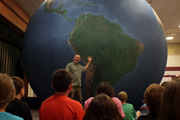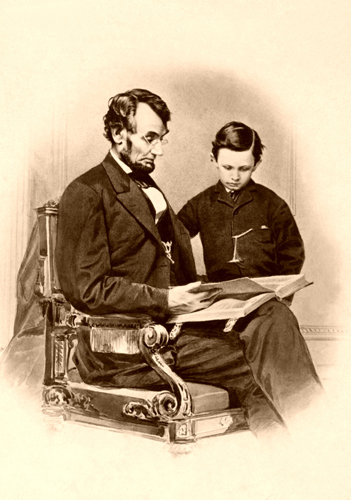In our ongoing series providing a beginner's guide to the world of school assembly programs, we now turn our attention to an explanation of the different types of fare available.
 Today, school shows take many forms. It can be very confusing knowing where to start. So many choices!
Today, school shows take many forms. It can be very confusing knowing where to start. So many choices!
But as vast as the world of school enrichment may be, there are certain broad categories and quite a bit of overlap between them.
Obviously, at a basic level, we have the purely entertaining shows. This category would include magicians, ventriloquists, clowns, jugglers and so on. The range of talent in enormous, from top flight entertainers to local amateurs. Some are wonderful and others are embarrassingly bad. Entertainment programs are most often used as part of a celebration, such as a field day or a family night, or as a an event immediately proceeding a holiday such as Halloween or Christmas. Some schools love them while others will not allow them at all.
 From there we move into a broader category containing many subsets. The field of “educational” enrichment programs. Many years ago, Mobile Ed was on of the originators of, and helped to pioneer, the category we know as Science Assemblies. Science programs include shows that either demonstrate, or involve students through hands on activities, facets of the world of science. These areas include chemistry, physics, natural science, biology, health and nutrition, as well as astronomy and earth science. Focusing on key ingredients of the school curriculum, these assemblies are designed to support the teachers in their struggle to get kids turned on to the world of science and the stuff they are supposed to be learning. Sometimes they merely excite students interest and other times they actually impart great educational content, but either way, they present opportunities, when done well, to show students things that are difficult and often impossible to replicate in a classroom.
From there we move into a broader category containing many subsets. The field of “educational” enrichment programs. Many years ago, Mobile Ed was on of the originators of, and helped to pioneer, the category we know as Science Assemblies. Science programs include shows that either demonstrate, or involve students through hands on activities, facets of the world of science. These areas include chemistry, physics, natural science, biology, health and nutrition, as well as astronomy and earth science. Focusing on key ingredients of the school curriculum, these assemblies are designed to support the teachers in their struggle to get kids turned on to the world of science and the stuff they are supposed to be learning. Sometimes they merely excite students interest and other times they actually impart great educational content, but either way, they present opportunities, when done well, to show students things that are difficult and often impossible to replicate in a classroom.
Next we have the social studies area. In this subsection we find primarily a wide selection of historical impersonators. Actors don costumes and impersonate characters from the past. It may be a visit from an ex president such as George Washington or Abraham Lincoln. It may be a re-enactor presenting himself as a Civil War soldier or a lumberjack from a hundred years ago. It may be someone taking the part of a colonial housewife from the Revolutionary period, or acting as Johnny Appleseed. Regardless, the costumes, props, and the “story telling” skills of the actor allow the performer to get kids into some world from our past, bringing history alive and engaging young imaginations.
 Of course, story telling does not need to be employed only by actors and re-enactors. Story telling is a vastly underestimated skill, and story telling is, in truth a good part, to one degree or another, employed by all school assembly presenters. And really good story tellers are a category of school show performers in and unto themselves, appearing before groups of children using all manner of skills, verbal and sometimes physical, to bring literature alive for children. But this area is tough, and requires really solid skill and talent from the performer for the show to be really engaging. Sadly, there are many, many storytellers, sweet people all, who nonetheless do not have these skills and talents. Without props or demonstrations to boost interest, a bad story teller can be a sad sight indeed.
Of course, story telling does not need to be employed only by actors and re-enactors. Story telling is a vastly underestimated skill, and story telling is, in truth a good part, to one degree or another, employed by all school assembly presenters. And really good story tellers are a category of school show performers in and unto themselves, appearing before groups of children using all manner of skills, verbal and sometimes physical, to bring literature alive for children. But this area is tough, and requires really solid skill and talent from the performer for the show to be really engaging. Sadly, there are many, many storytellers, sweet people all, who nonetheless do not have these skills and talents. Without props or demonstrations to boost interest, a bad story teller can be a sad sight indeed.
Which brings us to authors. Parents and teachers naturally love to see their children read. And good children's literature is a marvelous thing. We all love to put such works before our children and get them interested in the wonder of reading. And reading to our children often involves us as parents in the same imaginative worlds. So it is quite understandable that making arrangements for an author of books for children or someone responsible for the illustrations in these wonderful books, is an enticing and attractive idea. A visit from an author or illustrator can be a great addition to the school year.
From reading we move to the area of Fine Arts. This may be a visit from a musician, a ballet company, a symphony orchestra, a visual artist and so on.
Lastly, we come to the category of character building and bullying. Part of our education is to learn to become good citizens and good people. Schools often try to encourage solid patterns of behavior in students, helping them learn to navigate life with kindness and good manners toward all. Programs dealing with self esteem, character values and lessons on how to deal with bullying are all part of this general category.
Of course, there are many other side subjects, topics and opportunities of all manner. Far too many for a simple guide to cover all of them. But the broad topics above do cover the majority of what is available to schools. Of course, the geographical location of your school will determine to one degree or another what we have to choose from. While schools in urban or suburban areas surrounding cities often have a lot of choices, rural schools naturally depend upon presenters who are either local or who are willing to travel.
 Exactly what you decide to bring to your school is a choice, and how to determine what to choose is something we will take up in a future entry. But knowing the basics of what is available is a great start.
Exactly what you decide to bring to your school is a choice, and how to determine what to choose is something we will take up in a future entry. But knowing the basics of what is available is a great start.
Geoff Beauchamp is the Regional Manager of Mobile Ed Productions where "Education Through Entertainment" has been the guiding principal since 1979. Mobile Ed Productions produces and markets quality educational school assembly programs in the fields of science, history, writing, astronomy, natural science, mathematics, character issues and a variety of other curriculum based areas. In addition, Mr. Beauchamp is a professional actor with 30 years of experience in film, television and on stage. He created and still performs occasionally in Mobile Ed's THE LIVING LINCOLN. He also spent ten years coordinating assembly programs for the elementary school where his own children went to school.






